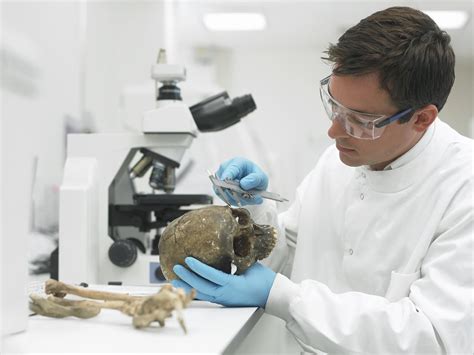Forensic Studies Careers

Exploring the Fascinating World of Forensic Studies: A Career Guide

Forensic studies, an intriguing field at the intersection of science and justice, offers a unique career path for those captivated by the idea of unraveling mysteries and contributing to the pursuit of truth. With its multifaceted nature, this discipline provides an array of specialized roles, each playing a crucial part in the criminal justice system. From crime scene investigation to laboratory analysis, the field of forensic science offers a challenging and rewarding career journey.
The Diverse Landscape of Forensic Careers

The realm of forensic studies encompasses a wide array of specialties, each demanding a unique skill set and offering distinct career trajectories. Here's an in-depth look at some of the most prominent career paths within this fascinating field.
Crime Scene Investigator (CSI)
A Crime Scene Investigator is often the first forensic professional on the scene. CSIs are responsible for meticulously documenting and collecting evidence from crime scenes. This involves taking photographs, creating sketches, and collecting physical evidence such as fingerprints, blood samples, and other trace materials. They must possess keen observational skills, attention to detail, and the ability to work in high-pressure situations. CSIs often work closely with law enforcement officers and other forensic experts to ensure the proper handling and preservation of evidence.
According to the National Institute of Justice, the average salary for a CSI ranges from $50,000 to $70,000 per year, with experienced professionals earning upwards of $100,000. The specific salary range depends on factors such as location, level of education, and years of experience.
Forensic Scientist
Forensic scientists are the analysts behind the scenes, working in laboratories to examine and interpret the evidence collected by CSIs. They employ a range of scientific techniques and methodologies to analyze physical evidence, including DNA analysis, toxicology, ballistics, and trace evidence examination. The role requires a strong foundation in chemistry, biology, and physics, as well as specialized knowledge in forensic science practices.
The Bureau of Labor Statistics reports that the median annual wage for forensic science technicians was $60,590 as of May 2020. However, salaries can vary significantly based on factors such as specialization, experience, and the employing organization.
| Forensic Science Specialization | Average Salary |
|---|---|
| DNA Analysis | $65,000 - $90,000 |
| Toxicology | $55,000 - $80,000 |
| Ballistics | $50,000 - $75,000 |
| Trace Evidence | $55,000 - $70,000 |

Forensic Psychologist
Forensic psychologists bridge the gap between psychology and the legal system. They assess and evaluate the mental state of individuals involved in legal proceedings, including defendants, victims, and witnesses. This role often involves conducting psychological assessments, providing expert testimony in court, and offering counseling services to victims and their families. A strong understanding of human behavior and the legal system is essential for this career path.
The salary for forensic psychologists can vary widely, depending on factors such as specialization, location, and experience. The American Psychology-Law Society suggests that forensic psychologists can earn between $60,000 and $150,000 annually, with the potential for higher earnings in private practice.
Forensic Anthropologist
Forensic anthropologists specialize in the analysis of human remains, particularly in cases where traditional identification methods are not feasible. They use their expertise in skeletal anatomy and anthropology to identify the sex, age, ancestry, and other demographic characteristics of the deceased. This role is crucial in helping law enforcement agencies solve cold cases and identify unidentified bodies.
The salary range for forensic anthropologists can be quite diverse, influenced by factors such as experience, education, and the nature of the employing organization. The American Board of Forensic Anthropology suggests that forensic anthropologists can earn between $40,000 and $100,000 per year, with the potential for higher earnings in academic or research positions.
Forensic Accountant
Forensic accountants, often referred to as "financial detectives," specialize in investigating and interpreting financial data related to criminal or civil cases. They are tasked with uncovering financial irregularities, such as fraud, embezzlement, or money laundering. This role requires a deep understanding of accounting principles, as well as strong analytical and investigative skills.
The Association of Certified Fraud Examiners reports that the median salary for a forensic accountant is around $70,000 per year, with the potential for higher earnings in specialized fields or with advanced certifications. The salary can also be influenced by the complexity of the cases and the reputation of the firm or organization.
Education and Training Requirements
The educational path to a career in forensic studies varies depending on the specific field and role. However, a strong foundation in science, particularly biology, chemistry, and physics, is often a prerequisite. Many forensic professionals hold bachelor's or master's degrees in fields such as forensic science, criminal justice, or a related discipline. For certain roles, such as forensic psychologist or anthropologist, a doctoral degree may be required.
In addition to academic qualifications, practical training and experience are crucial. Many forensic science programs offer hands-on training in crime scene investigation, laboratory analysis, and other specialized techniques. Internships and externships can provide valuable experience and networking opportunities, helping aspiring professionals build their expertise and make connections in the field.
Professional certifications, such as those offered by organizations like the American Board of Criminalistics or the American Board of Forensic Anthropology, can enhance a forensic professional's credibility and employability. These certifications typically require a combination of education, experience, and successful completion of rigorous examinations.
The Future of Forensic Studies Careers
The field of forensic studies is continually evolving, driven by advancements in technology and scientific research. As a result, the career landscape is dynamic and offers exciting opportunities for growth and specialization. Here are some key trends and developments shaping the future of forensic careers.
Advancements in DNA Analysis
DNA analysis has revolutionized forensic science, and ongoing advancements are further enhancing its capabilities. Next-generation sequencing technologies are enabling more precise and rapid DNA analysis, allowing for the identification of individuals from smaller and more degraded samples. This has significant implications for cold case investigations and the identification of missing persons.
Moreover, the development of DNA databases and the expansion of DNA profiling techniques are contributing to more accurate and comprehensive forensic analysis. As these technologies evolve, the demand for forensic scientists with expertise in DNA analysis is likely to increase, offering new career opportunities in this specialized field.
Integration of Artificial Intelligence and Machine Learning
Artificial Intelligence (AI) and Machine Learning (ML) are increasingly being integrated into forensic studies, offering new tools and methodologies for evidence analysis and interpretation. These technologies can automate repetitive tasks, enhance data analysis, and provide valuable insights for investigators. For instance, AI-powered image analysis can assist in the identification of individuals in surveillance footage, while ML algorithms can predict crime patterns and assist in forensic investigations.
As AI and ML technologies continue to advance, the demand for forensic professionals with expertise in these areas is likely to grow. This will create new career paths focused on the development and application of AI and ML in forensic science, offering exciting opportunities for innovation and problem-solving.
Enhanced Forensic Data Analysis and Visualization
The ability to effectively analyze and visualize forensic data is crucial for interpreting evidence and presenting findings to investigators and legal professionals. Advances in data analysis software and visualization techniques are enabling forensic scientists to gain deeper insights from complex datasets. This includes the use of advanced statistical methods, data mining techniques, and interactive visualization tools.
As forensic data analysis becomes more sophisticated, the demand for professionals with strong analytical skills and expertise in data visualization is expected to rise. This will open up new career paths focused on developing and applying advanced data analysis and visualization techniques in forensic investigations.
Frequently Asked Questions

What are the key skills needed for a career in forensic studies?
+
A career in forensic studies requires a unique blend of skills. These include strong analytical and critical thinking abilities, attention to detail, excellent problem-solving skills, and the ability to work methodically and efficiently. Communication skills are also vital, as forensic professionals often need to explain complex scientific findings to non-technical audiences, including law enforcement officers and legal professionals.
What are the educational requirements for a career in forensic science?
+
The educational path for a career in forensic science can vary depending on the specific field and role. However, a strong foundation in science, particularly biology, chemistry, and physics, is often a prerequisite. Many forensic professionals hold bachelor’s or master’s degrees in fields such as forensic science, criminal justice, or a related discipline. For certain roles, such as forensic psychologist or anthropologist, a doctoral degree may be required.
What are the job prospects like for forensic professionals?
+
The job prospects for forensic professionals are generally positive, driven by the ongoing demand for scientific expertise in criminal justice and legal proceedings. The field of forensic science is continually evolving, and new advancements in technology and scientific research are creating new career opportunities. Additionally, the increasing complexity of criminal investigations and the need for specialized expertise further enhance the demand for forensic professionals.
What are the key challenges faced by forensic professionals?
+
Forensic professionals face a range of challenges in their work. These include the pressure of working with sensitive and often disturbing evidence, the need for strict adherence to ethical guidelines and legal standards, and the complexity of scientific analysis and interpretation. Additionally, forensic professionals must often navigate the delicate balance between science and the legal system, ensuring that their findings are presented accurately and ethically.
What are the opportunities for career growth and specialization in forensic studies?
+
The field of forensic studies offers a wide range of opportunities for career growth and specialization. With ongoing advancements in technology and scientific research, new career paths are continually emerging. Forensic professionals can specialize in areas such as DNA analysis, toxicology, ballistics, trace evidence examination, forensic psychology, and more. Additionally, the increasing demand for specialized expertise in criminal investigations and legal proceedings provides ample opportunities for career advancement and leadership roles.



